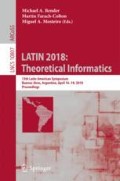Abstract
In the limited-workspace model, we assume that the input of size n lies in a random access read-only memory. The output has to be reported sequentially, and it cannot be accessed or modified. In addition, there is a read-write workspace of O(s) words, where \(s \in \{1, \dots , n\}\) is a given parameter. In a time-space trade-off, we are interested in how the running time of an algorithm improves as s varies from 1 to n.
We present a time-space trade-off for computing the Euclidean minimum spanning tree (\({{\mathrm{EMST}}}\)) of a set V of n sites in the plane. We present an algorithm that computes \({{\mathrm{EMST}}}(V)\) using \(O(n^3\log s /s^2)\) time and O(s) words of workspace. Our algorithm uses the fact that \({{\mathrm{EMST}}}(V)\) is a subgraph of the bounded-degree relative neighborhood graph of V, and applies Kruskal’s MST algorithm on it. To achieve this with limited workspace, we introduce a compact representation of planar graphs, called an s-net which allows us to manipulate its component structure during the execution of the algorithm.
B. Banyassady and W. Mulzer were supported in part by DFG project MU/3501/2. L. Barba was supported by the ETH Postdoctoral Fellowship.
Access this chapter
Tax calculation will be finalised at checkout
Purchases are for personal use only
Notes
- 1.
Naturally, if \(i + s - 1 > m\), we report the edges \(e_i, \dots , e_m\).
References
Ahn, H.-K., Baraldo, N., Oh, E., Silvestri, F.: A time-space trade-off for triangulations of points in the plane. In: Cao, Y., Chen, J. (eds.) COCOON 2017. LNCS, vol. 10392, pp. 3–12. Springer, Cham (2017). https://doi.org/10.1007/978-3-319-62389-4_1
Aronov, B., Korman, M., Pratt, S., van Renssen, A., Roeloffzen, M.: Time-space trade-offs for triangulating a simple polygon. In: Proceedings of the 15th Scandinavian Symposium and Workshops on Algorithm Theory (SWAT), pp. 30:1–30:12 (2016)
Arora, S., Barak, B.: Computational Complexity: A Modern Approach. Cambridge University Press, Cambridge (2009)
Asano, T., Buchin, K., Buchin, M., Korman, M., Mulzer, W., Rote, G., Schulz, A.: Memory-constrained algorithms for simple polygons. Comput. Geom. 46(8), 959–969 (2013)
Asano, T., Kirkpatrick, D.: Time-space tradeoffs for all-nearest-larger-neighbors problems. In: Dehne, F., Solis-Oba, R., Sack, J.-R. (eds.) WADS 2013. LNCS, vol. 8037, pp. 61–72. Springer, Heidelberg (2013). https://doi.org/10.1007/978-3-642-40104-6_6
Asano, T., Mulzer, W., Rote, G., Wang, Y.: Constant-work-space algorithms for geometric problems. J. Comput. Geom. 2(1), 46–68 (2011)
Bahoo, Y., Banyassady, B., Bose, P., Durocher, S., Mulzer, W.: Time-space trade-off for finding the k-visibility region of a point in a polygon. In: Poon, S.-H., Rahman, M.S., Yen, H.-C. (eds.) WALCOM 2017. LNCS, vol. 10167, pp. 308–319. Springer, Cham (2017). https://doi.org/10.1007/978-3-319-53925-6_24
Banyassady, B., Korman, M., Mulzer, W., van Renssen, A., Roeloffzen, M., Seiferth, P., Stein, Y.: Improved time-space trade-offs for computing Voronoi diagrams. In: Proceedings of the 34th Symposium on Theoretical Aspects of Computer Science (STACS), pp. 9:1–9:14 (2017)
Barba, L., Korman, M., Langerman, S., Sadakane, K., Silveira, R.I.: Space-time trade-offs for stack-based algorithms. Algorithmica 72(4), 1097–1129 (2015)
Barba, L., Korman, M., Langerman, S., Silveira, R.I.: Computing a visibility polygon using few variables. Comput. Geom. 47(9), 918–926 (2014)
de Berg, M., Cheong, O., van Kreveld, M., Overmars, M.H.: Computational Geometry: Algorithms and Applications, 3rd edn. Springer, Heidelberg (2008). https://doi.org/10.1007/978-3-540-77974-2
Chan, T.M., Chen, E.Y.: Multi-pass geometric algorithms. Discrete Comput. Geom. 37(1), 79–102 (2007)
Chan, T.M., Munro, J.I., Raman, V.: Selection and sorting in the “restore" model. In: Proceedings of the 25th Annual ACM-SIAM symposium Discrete Algorithms (SODA), pp. 995–1004 (2014)
Cormen, T.H., Leiserson, C.E., Rivest, R.L., Stein, C.: Introduction to Algorithms, 3rd edn. MIT Press, Cambridge (2009)
Darwish, O., Elmasry, A.: Optimal time-space tradeoff for the 2D convex-hull problem. In: Schulz, A.S., Wagner, D. (eds.) ESA 2014. LNCS, vol. 8737, pp. 284–295. Springer, Heidelberg (2014). https://doi.org/10.1007/978-3-662-44777-2_24
Har-Peled, S.: Shortest path in a polygon using sublinear space. J. Comput. Geom. 7(2), 19–45 (2016)
Jaromczyk, J.W., Toussaint, G.T.: Relative neighborhood graphs and their relatives. Proc. IEEE 80, 1502–1517 (1992)
Korman, M., Mulzer, W., van Renssen, A., Roeloffzen, M., Seiferth, P., Stein, Y.: Time-space trade-offs for triangulations and Voronoi diagrams. Comput. Geom. (2017, to appear)
Mitchell, J.S.B., Mulzer, W.: Proximity algorithms. In: Goodman, J.E., O’Rourke, J., Tóth, C.D. (eds.) Handbook of Discrete and Computational Geometry, 3rd edn, pp. 849–874. CRC Press, Boca Raton (2017)
Munro, J.I., Paterson, M.S.: Selection and sorting with limited storage. Theoret. Comput. Sci. 12(3), 315–323 (1980)
Munro, J.I., Raman, V.: Selection from read-only memory and sorting with minimum data movement. Theoret. Comput. Sci. 165(2), 311–323 (1996)
Pagter, J., Rauhe, T.: Optimal time-space trade-offs for sorting. In: Proceedings of the 39th Annual IEEE Symposium on Foundations of Computer Science (FOCS), pp. 264–268 (1998)
Reingold, O.: Undirected connectivity in log-space. J. ACM 55(4), 17 (2008)
Toussaint, G.T.: The relative neighbourhood graph of a finite planar set. Pattern Recogn. 12(4), 261–268 (1980)
Acknowledgments
This work was initiated at the Fields Workshop on Discrete and Computational Geometry, held July 31–August 04, 2017, at Carleton university. The authors would like to thank them and all the participants of the workshop for inspiring discussions and for providing a great research atmosphere.
Author information
Authors and Affiliations
Corresponding author
Editor information
Editors and Affiliations
Rights and permissions
Copyright information
© 2018 Springer International Publishing AG, part of Springer Nature
About this paper
Cite this paper
Banyassady, B., Barba, L., Mulzer, W. (2018). Time-Space Trade-Offs for Computing Euclidean Minimum Spanning Trees. In: Bender, M., Farach-Colton, M., Mosteiro, M. (eds) LATIN 2018: Theoretical Informatics. LATIN 2018. Lecture Notes in Computer Science(), vol 10807. Springer, Cham. https://doi.org/10.1007/978-3-319-77404-6_9
Download citation
DOI: https://doi.org/10.1007/978-3-319-77404-6_9
Published:
Publisher Name: Springer, Cham
Print ISBN: 978-3-319-77403-9
Online ISBN: 978-3-319-77404-6
eBook Packages: Computer ScienceComputer Science (R0)

